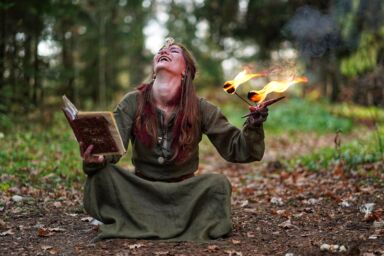Science vs Magic: Exploring Illusion and the Known
Jan 15, 2024

Science and magic, two seemingly opposite realms that have captivated the human imagination for centuries. Both offer a glimpse into the mysteries of our world, but how do they differ? Can science explain what magic cannot, or is there more to these mystical arts than meets the eye?
The Age-Old Battle
Since the dawn of civilization, humans have sought answers to the unexplainable. Science and magic emerged as rival approaches, each claiming to hold the key to unlocking the secrets of the universe. Science relies on systematic observation, experimentation, and logical reasoning to understand the natural world, while magic harnesses unseen forces, invoking supernatural beings and manipulating energies beyond our comprehension.
Despite their differences, science and magic often intersect and overlap in unexpected ways. Early alchemists, for example, blurred the lines between these disciplines, seeking both mystical transformation and scientific knowledge. Conversely, modern science fiction often explores the boundaries between science and magic, challenging our perceptions of what is possible.
The Scientific Method: Exploring the Known
At the core of science lies the scientific method, a systematic approach to understanding the world through observation, experimentation, and analysis. Scientists propose hypotheses, conduct experiments, and collect data to test their theories against the known laws of nature.
The scientific method has allowed us to make incredible discoveries, revolutionizing our understanding of the universe. From Newton's laws of motion to Einstein's theory of relativity, science has revealed the fundamental principles that govern our reality.
Science provides practical applications that have transformed our lives. Medical breakthroughs, technological advancements, and the exploration of space are all products of scientific inquiry. It gives us a deeper understanding of how things work and provides the foundation for evidence-based decision making.
Magic: The Art of Illusion
While science seeks to explain the natural world through empirical evidence, magic delves into the realm of perception and mystery. Magicians use sleight of hand, misdirection, and psychological techniques to create the illusion of supernatural phenomena.
What sets magic apart is its focus on performance and entertainment. Magicians engage their audience, leaving them marveling at the impossible. They play with our senses, challenging what we believe to be true.
For centuries, magic fascinated people and was often intertwined with religious rituals and cultural practices. From ancient Egyptian mysticism to medieval alchemy, magic served as a bridge between mortals and the divine. It captivated hearts and minds, offering a glimpse into a reality beyond the ordinary.
The Illusion of Magic
Despite its wonderment, magic is ultimately an intricate web of perceptual tricks. By exploiting the limitations and biases of human perception, magicians astonish their audiences. Sleight of hand, misdirection, and cleverly designed props create the illusion of the impossible.
Understanding the mechanics behind magic tricks can be just as intriguing as witnessing them. Cognitive sciences, psychology, and neurobiology shed light on why our brains are susceptible to manipulation. They reveal the shortcuts our minds take to make sense of the world, which magicians exploit to defy our expectations.
The Mystery of the Unknown
While science excels at explaining the natural world, it has yet to uncover all of its secrets. There are realms science cannot penetrate, where questions remain unanswered. These gaps in knowledge leave room for wonder and speculation, giving rise to the mystical allure of magic.
Consciousness, for instance, is a tantalizing enigma. Despite tremendous advances in neuroscience, we still struggle to understand how subjective experiences arise from the physical brain. What happens to our consciousness after death? These profound questions lie at the heart of our existence, evoking a sense of awe and fueling spiritual and magical beliefs.
Moreover, there are phenomena that defy scientific explanation. From mysterious apparitions to inexplicable occurrences in the natural world, these unexplained phenomena challenge our understanding of reality. While some may ultimately find scientific explanations in the future, others might forever remain outside the realm of scientific scrutiny.
Science and Magic: A Symbiotic Relationship
Contrary to popular belief, science and magic are not mutually exclusive. In fact, they often complement and inspire each other, pushing the boundaries of human knowledge and imagination.
Science fiction, for instance, combines scientific principles with magical elements to create immersive worlds that captivate audiences. From Star Trek's teleportation to Harry Potter's magic spells, these imaginative works blend science and magic, reminding us of the infinite possibilities that lie ahead.
Furthermore, some scientific discoveries may seem like magic to those unacquainted with the underlying principles. Concepts like quantum entanglement or the strange behavior of subatomic particles can appear fantastical, defying common sense. Yet, these phenomena are grounded in rigorous scientific research and experimentation, revealing the wondrous complexity of the universe.
Final Thoughts
Science and magic are two sides of the same coin—our innate curiosity and thirst for discovery. While science unravels the mysteries of the natural world through logic and empirical evidence, magic awakens our sense of wonder and challenges the limits of our perception.
Both science and magic contribute to our understanding of the universe in their unique ways. Science provides practical knowledge that fuels progress and innovation, while magic reminds us to embrace the unknown and ponder the possibilities beyond the rational. Ultimately, it is the harmony between these seemingly opposing forces that propels us forward on our quest for knowledge and expands the boundaries of human imagination.